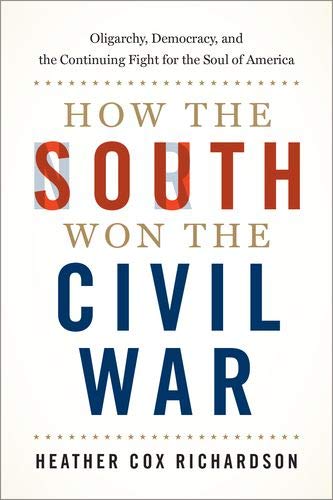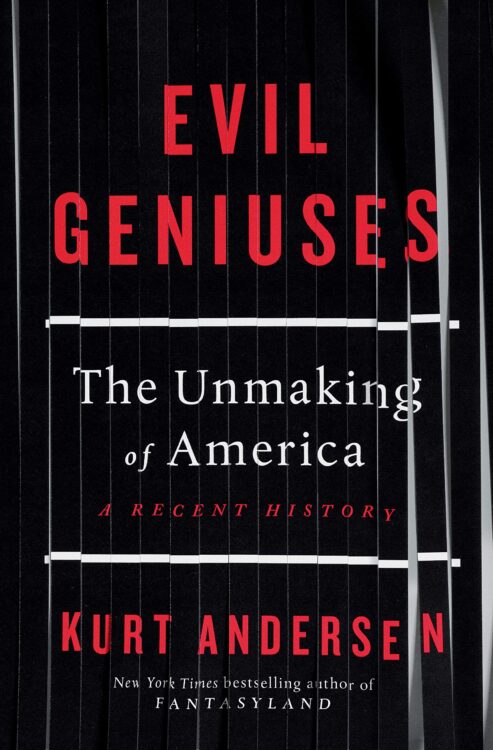Southern white male elite power traces back to the Constitution.
In her 2020 book, How the South Won the Civil War: Oligarchy, Democracy and the Continuing Fight for the Soul of America, Heather Cox Richardson provides a history of the two opposing ideas that are rooted in US history and may be the source of the political polarization seen today. She notes, “From its founding, American has stood at the nexus of democracy and oligarchy” (p. 22). The Civil War and the many legislative battles, increasing or decreasing oppression of minorities, in states and at the federal levels, were fueled by these competing ideologies.
From the 1930s to the 1980s, a vastly popular “liberal consensus” developed that focused on “creating economic security and equality of opportunity” through the protection of the vulnerable and regulation of the economy to avert vast inequality” (p. xiv). Although the federal government still favored white people in many of its policies, opportunities for increased well-being and wealth generation were opened to minorities. Even Superman, when he first appeared in 1938 admonished schoolchildren that if they heard anyone talk against another because of their race, religion, or national origin, “don’t wait” to “tell him that kind of talk is un-American” (p. xxv).
But another root of US culture is white elite male supremacy. The “founding fathers” were landed slave-holding gentry. “Without irony, Virginian James Madison crafted the Constitution to guarantee that wealthy slaveholders would control the new government” (p. 21). The Founders did not include the non-wealthy, non-male in their view that “all men are created equal.”
In the Founders’ worldview, women, African slaves, Native peoples, and the poor were all inferior and could not handle the power of participating in societal decision making. All those others were not capable or worthy enough for self-determination like the white wealthy male. And the wealthy males relied on the labor of their wives, slaves, and others to make and keep their wealth. “In the Founders’ minds, then, the principle of equality depended on inequality” (p. xv).
Nevertheless, over the course of history, US policies grew to enable poor white men to advance and be treated almost equally with elite white males. “While Europe was mired in oligarchy, Americans had faith that God had made them capable of managing their own affairs” (p. 25). The 20th century saw advances for minorities and women.
However, the countermovement to these progressive trends, Movement Conservatism, initiated in the 1950s, took up the alternative root of US culture: that the elite should have wealth trickle up to them from the non-elites, along with the power to make decisions “for the good of all.”
“Like elite slaveholders before the Civil War, they believed in a world defined by hierarchies, where most people—dull, uneducated, black, female, weak, or poor—needed the guidance of their betters” (p. xiv). Their work at menial tasks would be accumulated in the hands of their betters, who knew how to use it to create progress.
Richardson documents how Movement Conservatives started in the 20th century to lay out the same arguments that the elite slave owners in the 19th century had. Both groups believed they alone knew how to run the country and so the non-loyal had to be prevented from accessing the tools of government. Both groups “suppressed voting, rigged the mechanics of government, silenced the opposition press, and dehumanized their opponents” and felt themselves above the law (p. xvii).
Because facts and reason don’t work to argue for inequality, people in both groups reject expertise and invent stories to support their view of the world—for example, that Southern white men were incapable of selfishness and servility, that those who are not loyal followers are lazy, non-Christian, or enemies. Both groups blame “East coast liberals” for the nation’s problems. Both groups have faith that “if the government simply turned rich men loose to work their magic, they would create ever-expanding prosperity and everyone would get richer” (p.180).article continues after advertisement
In his book, Evil Geniuses, Kurt Anderson describes in detail a shift in the US away from the liberal consensus of fairness for all with the superrich’s manipulation of laws and politics to tilt the playing field towards themselves, with the effect of hollowing out the middle class. Inequality has never been greater, burgeoning since the 1980s with what economists call the “Great Divergence” in wealth. The wealthy have more power than ever. In this way, the tendency toward oligarchy may have “won” over democracy—for now.
Related posts
“The Psychology of Domestic Terrorists: Eliminationism“
References
Richardson, Heather C. (2020). How the South Won the Civil War: Oligarchy, Democracy and the Continuing Fight for the Soul of America. New York: Oxford University Press.



